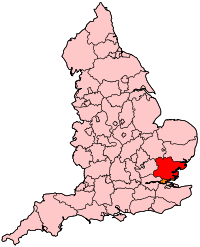
Essex dialect
Encyclopedia

Dialect
The term dialect is used in two distinct ways, even by linguists. One usage refers to a variety of a language that is a characteristic of a particular group of the language's speakers. The term is applied most often to regional speech patterns, but a dialect may also be defined by other factors,...
is rapidly disappearing variation of East Anglian English
East Anglian English
East Anglian English is a dialect of English spoken in East Anglia. This easternmost area of England was probably home to the first-ever form of language which can be called English...
and is now mainly confined to the middle, north and the east of Essex
Essex
Essex is a ceremonial and non-metropolitan county in the East region of England, and one of the home counties. It is located to the northeast of Greater London. It borders with Cambridgeshire and Suffolk to the north, Hertfordshire to the west, Kent to the South and London to the south west...
. It shares vast similarities with both Suffolk
Suffolk dialect
Suffolk dialect is an English dialect. Like many English dialects it is rapidly disappearing, with the advent of increasing social and geographical mobility and the influence of the media...
and Norfolk
Norfolk dialect
The Norfolk dialect, also known as Broad Norfolk, is a dialect that was once, and to a great extent, still is spoken by those living in the county of Norfolk in England...
dialects, with its own peculiarities. With rapid urbanisation in the 20th century as well as the impact of the London overspill
London overspill
London overspill is the term given to the communities created - largely consisting of publicly provided housing - as a result of the Government policy of moving residents out of Greater London, England into other towns around the South East, East Anglia and beyond.-Policy development:The policy...
, Estuary English
Estuary English
Estuary English is a dialect of English widely spoken in South East England, especially along the River Thames and its estuary. Phonetician John C. Wells defines Estuary English as "Standard English spoken with the accent of the southeast of England"...
, a milder form of the London accent predominant largely along the Thames Estuary and thus the name, has become common, mainly in the southern portion of the county. As a result of the growing London influence, the usage of rural accents everywhere and the rural Essex dialect
Dialect
The term dialect is used in two distinct ways, even by linguists. One usage refers to a variety of a language that is a characteristic of a particular group of the language's speakers. The term is applied most often to regional speech patterns, but a dialect may also be defined by other factors,...
is now normally, but not always confined to older generations in some of the areas affected and the dialect itself stands in a vulnerable state in those affected parts of the county. Elsewhere in Essex
Essex
Essex is a ceremonial and non-metropolitan county in the East region of England, and one of the home counties. It is located to the northeast of Greater London. It borders with Cambridgeshire and Suffolk to the north, Hertfordshire to the west, Kent to the South and London to the south west...
, the dialect and rural accent continues.
Many of the unique patterns of speech, as well as vocabulary were recorded in the nineteenth and early twentieth centuries
An Essex Dialect Handbook has been published, however recently, the Essex County Records office have recorded a CD of the sounds of Essex Dialect speakers in an effort to preserve the dialect.
Pronunciation
- The diphthong of [aɪ] which is common amongst East Anglian EnglishEast Anglian EnglishEast Anglian English is a dialect of English spoken in East Anglia. This easternmost area of England was probably home to the first-ever form of language which can be called English...
and other predominantly English rural dialects e.g. Right > Roight - The Shortening of certain elongated vowel sounds from [iː] to [ɪ] e.g. Been > Bin, Seen > Sin
- Yod-dropping is common, as in the NorfolkNorfolkNorfolk is a low-lying county in the East of England. It has borders with Lincolnshire to the west, Cambridgeshire to the west and southwest and Suffolk to the south. Its northern and eastern boundaries are the North Sea coast and to the north-west the county is bordered by The Wash. The county...
and Suffolk dialectSuffolk dialectSuffolk dialect is an English dialect. Like many English dialects it is rapidly disappearing, with the advent of increasing social and geographical mobility and the influence of the media...
s - Dropping of Ls e.g. Old > Owd
Characteristics
Frequently sounds are elidedElision
Elision is the omission of one or more sounds in a word or phrase, producing a result that is easier for the speaker to pronounce...
to allow the easy flow of speech; e.g.,
Wonderful > Wunnerful,
Correctly > Creckly,
St Osyth > Tozy
Grammar
Varying use of 'Do' which is a common trait in NorfolkNorfolk
Norfolk is a low-lying county in the East of England. It has borders with Lincolnshire to the west, Cambridgeshire to the west and southwest and Suffolk to the south. Its northern and eastern boundaries are the North Sea coast and to the north-west the county is bordered by The Wash. The county...
and Suffolk
Suffolk
Suffolk is a non-metropolitan county of historic origin in East Anglia, England. It has borders with Norfolk to the north, Cambridgeshire to the west and Essex to the south. The North Sea lies to the east...
are exhibited in the Essex dialect.

